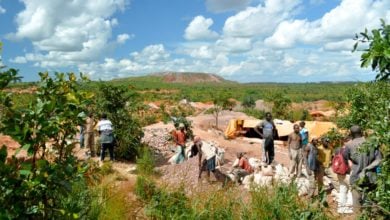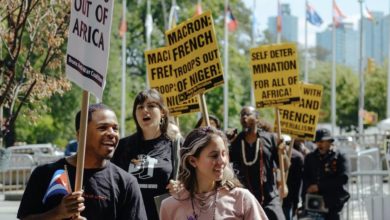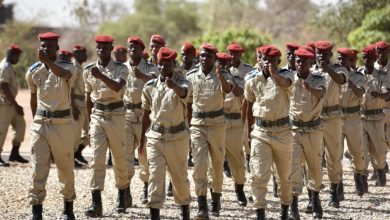Photo: President of Senegal Macky Sall with former U.S. Secretary of State Mike Pompeo
Sixteen people died, 360 were injured and 500 were arrested protesting criminal charges against Ousmane Sonko, a popular opposition politician and possible presidential candidate from the PASTEF Party. The demonstrations started in Dakar, the capital, and in just two days nine protesters were killed by the government. People took to the streets because they fear the current president, Macky Sall, might illegally try to serve a third term and because he has been suppressing opposition candidates, protesters and journalists. Overall, these protests are against the Sall government’s policies and France’s continued neocolonial domination of Senegal’s economy and political system.
Injustices of Macky Sall government
Protesters worry that the current president, Macky Sall, may try to serve a third term, which would go against the constitution. Sall is trying to take advantage of a constitutional amendment made in 2016 that limited the number of terms a president can serve. Although the constitution says no one can serve more than two terms in a row, some believe Sall might not count his first, longer seven-year term and attempt to run again.
The protests against Macky Sall became stronger when a Dakar court charged Ousmane Sonko with “corrupting youth.” This happened soon after the courts cleared Sonko of a previous rape charge. If the courts find Sonko guilty, they could sentence him to two years in prison and bar Sonko from running for president against Macky Sall in February. Authorities confined him to his home after police detained him for leading a “Freedom Caravan” from Zuginchor, where he was elected mayor to Dakar.
Sonko is not the only opposition figure targeted by the Sall administration. Journalist Pape Alé Niang was detained in November 2022 for sharing a police report that allegedly cleared Sonko of the rape charge. Niang was charged with “disclosure of information to harm the national defense” and “dissemination of false information.” He was released on Jan. 10, but his case serves as an example of how the Sall administration employs legal means, known as lawfare, to silence political opposition.
President Sall has a record of using the legal system to silence opposition voices. This strategy was clear during the 2019 election when Khalifa Sall, the former mayor of Dakar, was imprisoned for embezzlement. Karim Wade, another candidate, was exiled after serving a three-year prison sentence for corruption. This history leaves many skeptical of the validity of the charges.
Ousmane Sonko and the movement behind him
Ousmane Sonko is a former tax official who rose to prominence by exposing corrupt practices among Senegal’s elite. Since then, Sonko became the leading opposition figure. He went on to run for president against Macky Sall in 2019, winning 15% of the vote.
Sonko represents the PASTEF Party, which stands for African Patriots of Senegal for Work, Ethics, and Fraternity. The party’s platform resonates with the grievances of the working class and youth, centering on the fight against corruption among the elite and advocating for a state-led development policy.
This movement is taking shape against the backdrop of a country grappling with a poverty rate of 40%, rising unemployment and widening inequality. These pressing issues are fueling the working class in Senegal to seek political alternatives beyond the confines of the neocolonial political establishment.
One of Sonko’s key positions poses a threat to Senegal’s former colonizer, France. In his 2019 campaign, Sonko advocated for severing Senegal’s neocolonial ties with its currency, called the West African CFA Franc. Senegal has used the Franc since the era of French colonization. This economic arrangement aims to maintain Senegal and other African nations as inexpensive sources of raw materials while captive recipients of French goods.
French businesses dominate and undermine local Senegalese competition in this neocolonial relationship. During the initial protests against Sonko’s detention in March, protesters attacked French businesses, which had come to symbolize the existing power structure in the country. As Senegalese Economist Ndongo Sylla pointed out, “If you sabotage things in Senegal you have a high probability of sabotaging French property and business. We are a Franco-African country.”
Former African Union Ambassador to the United States, Arikana Chihombori-Quao, referred to this arrangement as the “Pact for the continuation of colonization.” This policy is justified by the racist contention African countries colonized by France owe a debt to the French for their supposed “civilizing” influence. But in reality, it is France that owes Senegal reparations for centuries of theft and underdevelopment.
Sonko’s challenge to the dominance of the West African CFA Franc in Senegal’s economy and his advocacy for a domestic currency make him and the PASTEF movement enemies of the neo-colonial government of President Macky Sall. Currently, there is a trend across former French colonies in West Africa to pursue greater independence from the West. Burkina Faso, Mali and Guinea are moving away from dependence on France.
While relative calm has returned to the streets for now, the harsh realities of poverty, unemployment, economic inequality and reliance on France continue to weigh on the minds of the Senegalese people. The Senegalese working class is looking for solutions outside the existing system. If President Sall’s government unlawfully jails Sonko or if Sall attempts to run for a third term in February, then that would likely mean renewed protests.





